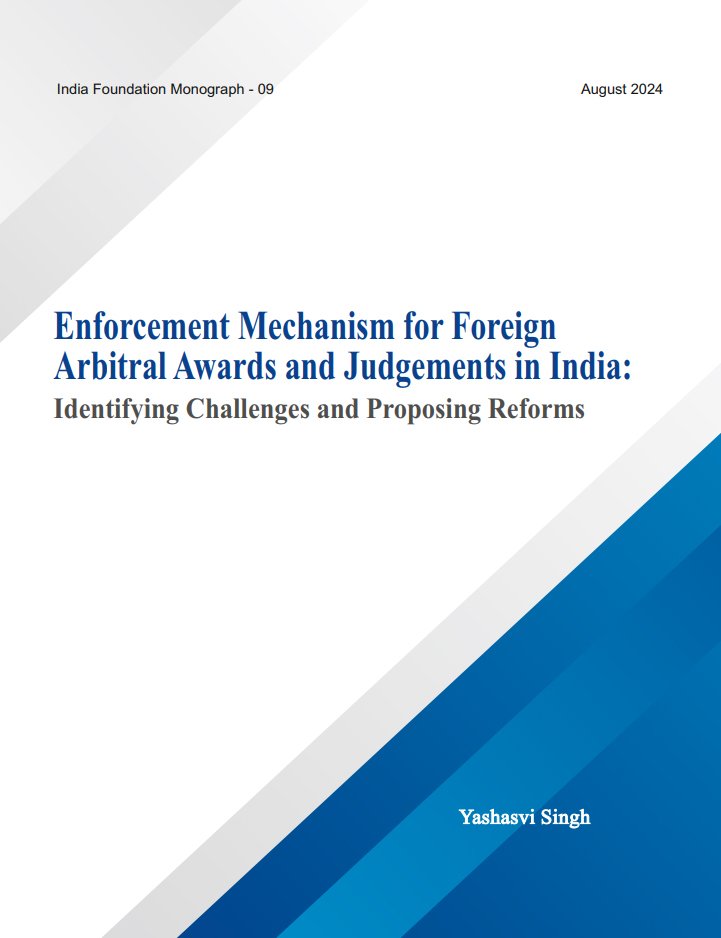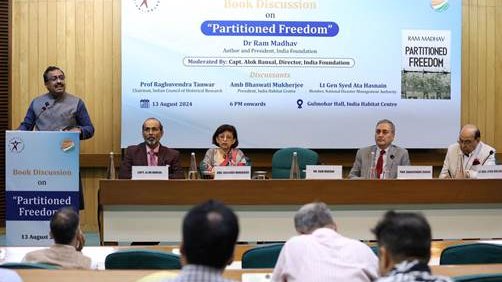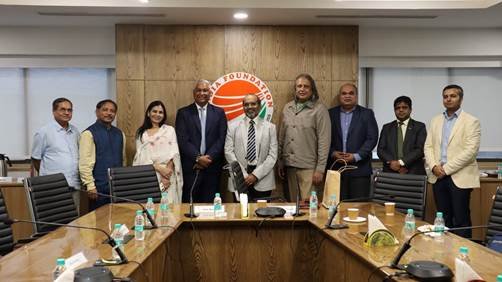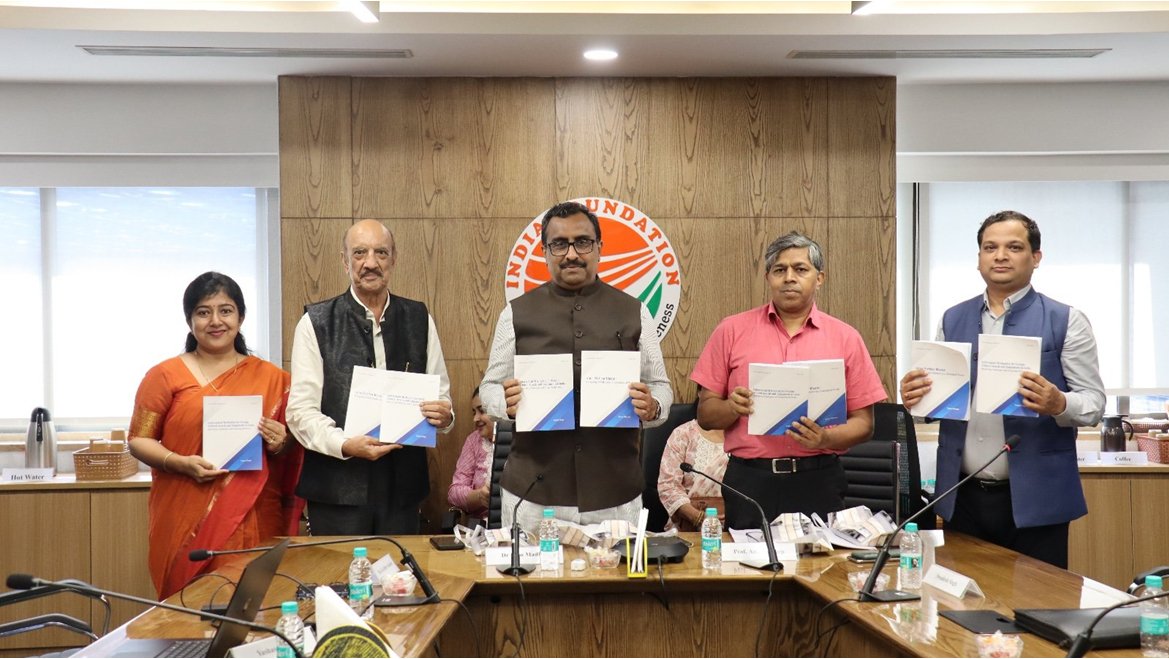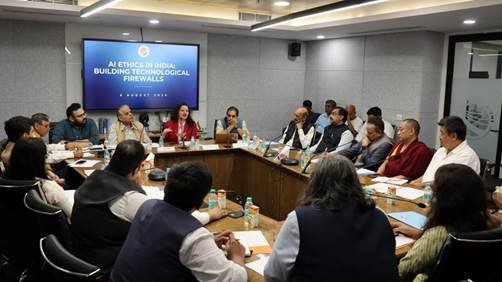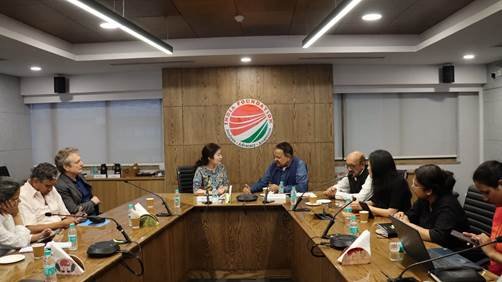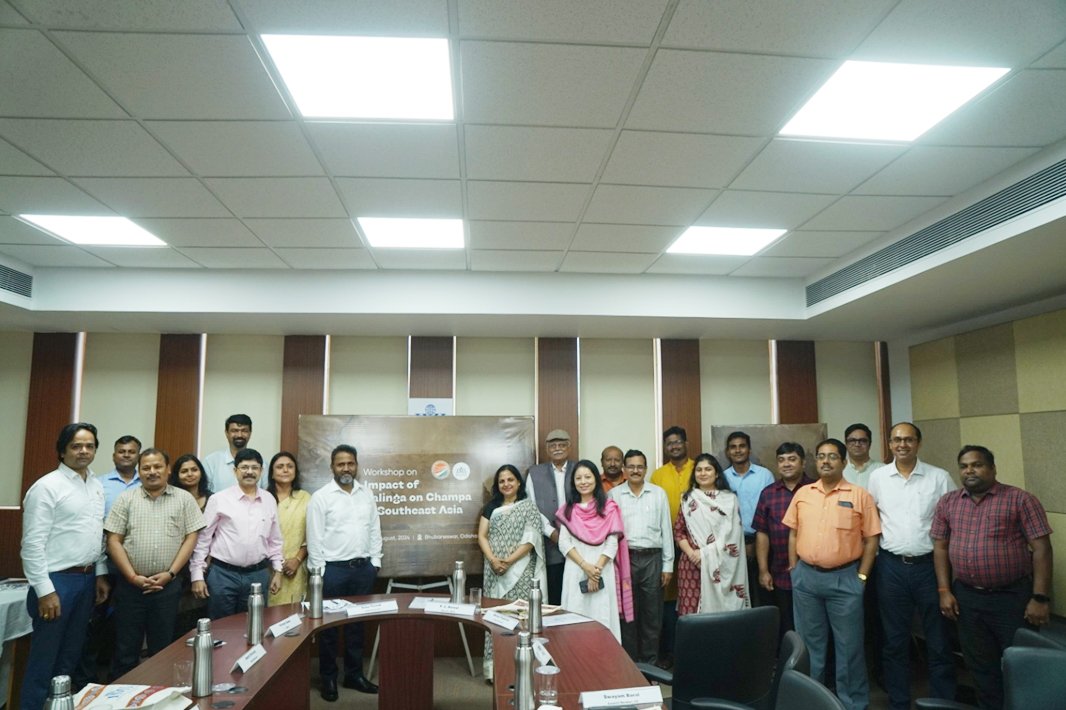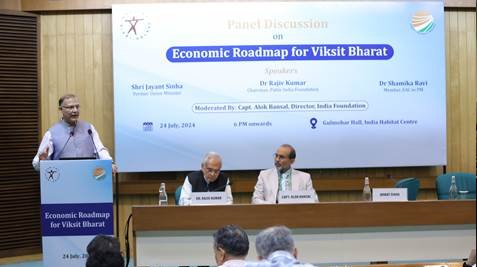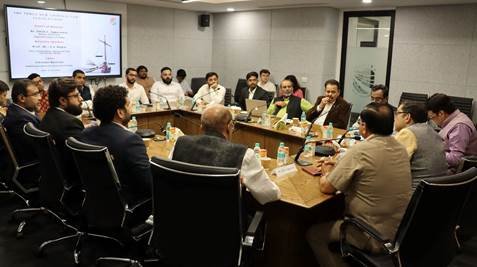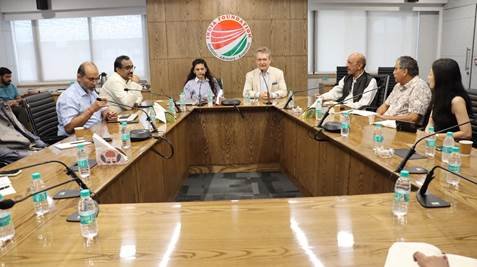Book Discussion on “Partitioned Freedom” by Dr Ram Madhav
India Foundation in collaboration with India Habitat Centre, organised a discussion on the book “Partitioned Freedom” authored by Dr Ram Madhav, President, India Foundation. The session was moderated by Capt Alok Bansal, Director, India Foundation. The discussants in the panel included Prof Raghuvendra Tanwar, Chairman, ICHR; Lt Gen Syed Ata Hasnain, Member, NDMA, and Amb Bhaswati Mukherjee, President, India Habitat Centre.
India Foundation Dialogue – 96
India Foundation organised the 96th India Foundation Dialogue on 12 August, 2024. The dialogue was addressed by Dr Satyendra Prasad, non-resident Senior Fellow at Carnegie Endowment for International Peace, on the theme”Geopolitics, climate change and stability in the Blue Pacific”.The session was chaired byCapt Alok Bansal, Director, India Foundation.
5th India Foundation Monograph Series
India Foundation organized the 5th India Foundation Monograph series on August 08, 2024. As a part of the series, India Foundation released two monographs, the first authored by Ms Yashasvi Singh and titled “Enforcement Mechanism for Foreign Arbitral Awards and Judgments in India: Identifying Challenges and Proposing Reforms”, and the other authored by Mr Yatan Sharma and titled “Atma-Nirbhar Bharat: Navigating Self-Reliance in a Globalized World”. The session was chaired by Dr. Ram Madhav, President, India Foundation. Prof. Anurag Deep of Indian Law Institute, New Delhi, delivered the expert remarks. Presenting the key highlights of her monograph, Ms Singh argued that while the judiciary has been pro-enforcement in terms of the execution of arbitral awards, the government and courts need to work further on a smooth implementation of the awards and bring the Indian legal infrastructure of arbitration in alignment with the best international practices. Through his presentation, Mr Sharma explained the Atma-Nirbhar Bharat initiative of the Indian government and how it furthered the cause for improving self-reliance in the global socio-economic framework.
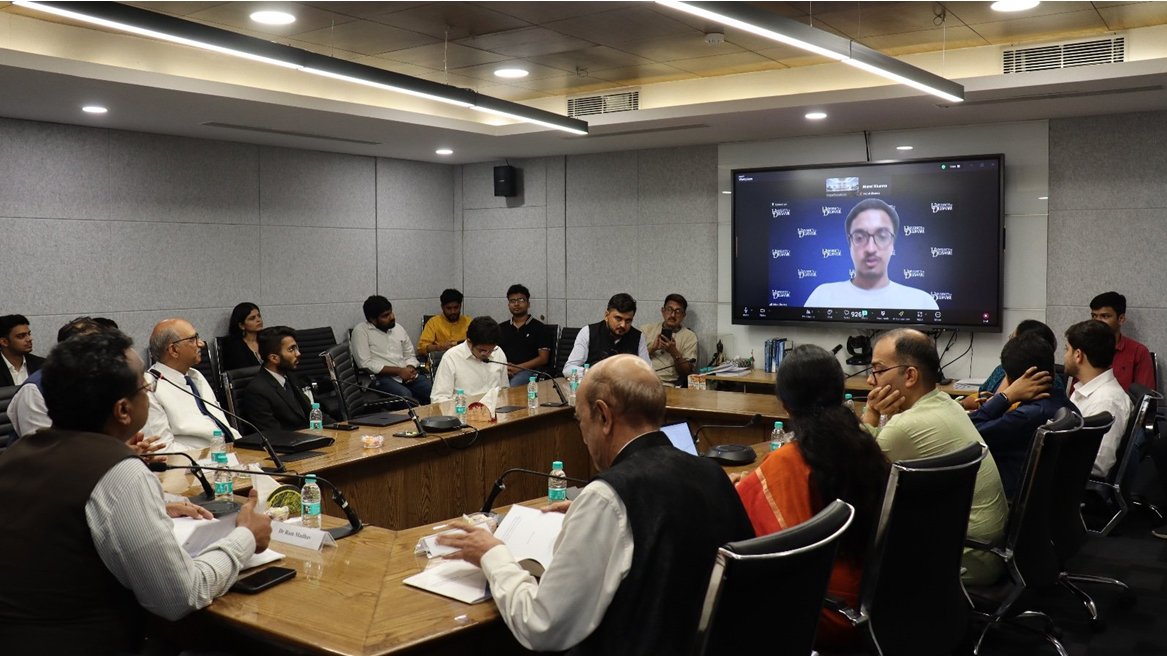
Roundtable Discussion on AI Ethics
India Foundation hosted a roundtable discussion on”AI Ethics in India: Building Technological Firewalls” on 06 August, 2024. The discussion was addressed byDr Subi Chaturvedi, Global SVP, InMobi; Shri Tanuj Bhojwani, Head, People+AI; Shri Rishabh Sinha, Legal Head, Velocity; and Lt Gen Raj Shukla, Member, Union Public Service Commission.The session was chaired by Lt Gen Arun Sahni, Member, Governing Council, India Foundation.
Presentation by Dr Hsiao-Chen Lin
Dr Hsiao-Chen Lin, Assistant Professor, Tamkang University and Member, Ministry of National Defense QDR Advisory Committee, Taiwan,delivered a presentation on “India-Taiwan Relations under the Indo-Pacific Strategy”at India Foundation office on 05 August, 2024.
Workshop on Impact of Kalinga on Champa in Southeast Asia
The historical and cultural interactions between the ancient civilizations of India and Southeast Asia have been profound and enduring. Among these interactions, the influence of the Kalinga region (present-day Odisha) on the Champa Kingdom (located in Vietnam) stands out as a significant chapter in the annals of cultural exchange. Archaeologists, geographers and historians have traced the land and sea routes leading to ‘Indianisation of Southeast Asia’ since the very early period. This cultural diffusion was facilitated by maritime trade routes that connected the Indian subcontinent with Southeast Asia. Indian traders, scholars, and religious missionaries travelled these routes, bringing with them a rich amalgamation of ideas and practices.
The Champa Kingdom, which flourished from the 2nd to the 19th century in what is now central and southern Vietnam, played a significant role in shaping the cultural, political, and economic landscapes of Southeast Asia. The remnants of Champa’s civilization, including its temples, inscriptions, and artefacts, offer a glimpse into its rich heritage and influence.
It is believed that Kalinga had close maritime interactions with the ancient kingdom of Champa in Vietnam. The people of Champa known as Chams were engaged in maritime trade with Kalinga leaving a huge impact on the political, economic, religious and social life of the Chams and the remnants of that hallmark are still visible in Vietnam today. A renewed interest in spiritual enlightenment has bestowed a fresh perspective on understanding and retracing the Kalinga-Champa linkages.
Given this backdrop, India Foundation in collaboration with the International Management Institute (IMI), Bhubaneswar organised a Workshop on the “Impact of Kalinga on Champa in Southeast Asia” on 01 August 2024 at IMI, Bhubaneswar exploring the multifaceted impacts of Kalinga on Champa culture including the historical, political, and socio-economic exchanges that shaped the interactions in Southeast Asia. By delving into the rich historical interactions between Kalinga and the Champa territory, the Workshop aims to uncover the shared cultural heritage that continues to bind India and Southeast Asia and stimulate further research and exploration in this fascinating field. This is the Inaugural Workshop of the ICSSR-sponsored project “Kalinga and Champa: Retracing Civilisational Linkages between India and Vietnam”.
This Workshop brings together historians, archaeologists, anthropologists and scholars specializing in Indian and Southeast Asian history to explore and discuss the enduring legacy of the Kalinga-Champa connection and its cultural imprint on Southeast Asia. Various sub-themes deliberated in the Workshop were Historical Overview of the Kalinga region, Maritime Trade and the influence of Kalinga on Champa in Southeast Asia, Political and Economic Engagements between Kalinga and Champa and Archaeological findings highlighting the connections between Kalinga and Champa. Inaugural Session was addressed by Prof (Dr) P.C. Biswal, Director, IMI, Bhubaneswar and Dr Sonu Trivedi, Associate Professor, Zakir Husain Delhi College, University of Delhi and Distinguished Fellow, India Foundation. Speakers of the working sessions were Mr Swayam Baral, Council Member, CII, Prof Harihara Panda, Professor, National Defence Academy, Pune and Member, ICHR, Mr Amrit Ruturaj, Collector, Dhenkanal, Odisha, Prof Nirmal Chandra Dash, Professor Emeritus, Department of Anthropology, KISS University, Bhubaneswar, Prof Ramakrushna Panigrahi, Professor, International Management Institute (IMI), Bhubaneswar, Prof Gyanaranjan Swain, Professor and Head of the School of Political Science, Gangadhar Meher University, Sambalpur, Odisha, Dr Swayam Prava Mishra, Assistant Professor, Department of A&A Economics Utkal University, Dr Anirban Bandyopadhyay, Associate Professor, School of Tribal Culture, Philosophy and Eco-spiritualism, KISS, Bhubaneswar, Dr Siba Sankar Sahu, Assistant Professor, Department of Geography, Ravenshaw University, Dr Tanaya Mohanty, Associate Professor, Department of Sociology, Utkal University, Dr Shristi Pukhrem, Deputy Director (Academics & Research), India Foundation and Ms Shivani Badgaiyan, Research Fellow, India Foundation.
13th Young Thinkers’ Meet 2024
The 13th edition of Young Thinkers’ Meet was held at Chitrakote, Bastar, Chhattisgarh from 26-28 July 2024. With the theme ‘Viksit Bharat’ – Ideas for a Developed India, it saw an impressive turnout of 80 attendees. The diverse group, hailing from 21 different states, had an average age of about 29 years. Young Thinkers’ Meet (YTM) is an initiative of India Foundation that began its journey in 2012 at Coorg, Karnataka. The annually held event acts as a confluence of young nationalistic minds hailing from varied walks of life across India.
YTM is an annual meet organised by India Foundation, a New Delhi based think-tank, for individuals (mostly under 35 years) who are driven by the idea of a New India. YTM today has an alumni base of over three hundred individuals who belong to different parts of India and come with unique life experiences and skill sets. There are social activists, political activists, NGO workers, academics, journalists, scientists, corporate professionals and students from reputed international universities. Participants in the YTM come from all parts of the country and indulge themselves in deliberations and debates on issues of contemporary national importance. The format of the meet is immersive and experiential rather than a lecture-based classroom format. The number of delegates at any YTM has varied from seventy-five to eighty-five and involves freewheeling discussion over two to three days. Each year YTM moves to a new location and helps the young delegates explore the incredible diversity of the country. The meet has previously happened in Coorg, Karnataka; Manesar, Haryana; Pune, Maharashtra; Pachmarhi, Madhya Pradesh; Patnitop, Jammu & Kashmir; Vadodara, Gujarat; Kasauli, Himachal Pradesh; Chilika, Odisha; Pahalgam and Srinagar, Jammu & Kashmir, Annavaram, Andhra Pradesh & Guwahati, Assam. Due to the national lockdown, YTM happened virtually in 2020.
On 26 July 2024, the inaugural session on “Viksit Bharat 2047: Amrit Kaal to Swarnim Kaal” began with Dr. Ram Madhav, President of India Foundation, encouraging delegates to introduce themselves. The diverse backgrounds and regions represented showcased the intellectual expansion inspiring the central theme of Viksit Bharat. RSS Sah-Sarkaryavah Shri Atul Limaye followed, discussing the concept of Vikas (development) and seeking inputs on spiritual upliftment, financial advancement, and international recognition. Dr. Madhav concluded the session, emphasizing that human aspiration drives all forms of Vikas, alongside individual and societal aspiration in a balanced manner. Shri Vijay Dayaram K, Collector & District Magistrate, Bastar, Chhattisgarh was also present during the session and gave his remarks. A brief interaction with Shri Sundarraj Pattilingam, Inspector General of Police, Bastar range, Chhattisgarh, detailed the Maoist insurgency in the Bastar region.

On 27 July 2024, the delegates had the opportunity to visit a forward CRPF camp during the early hours, and have conversations with individuals posted in Naxal-infested territories.
The first panel discussion was on “Security Challenges in Bharat 2047”. It was moderated by Dr. Sriparna Pathak, Associate Professor at Jindal School of International Affairs, and the panel featured Dr. Shristi Pukhrem, Deputy Director (Academics & Research), India Foundation, Dr. Manoj Kumar Panigrahi, Assistant Professor, O.P. Jindal Global University, Shri Divyanshu Jindal, Consultant, Ministry of External Affairs, Government of India, and Shri Nishit Kumar, Consultant, Ministry of External Affairs, Government of India.

The panel highlighted the interplay between internal and external security threats, emphasizing traditional challenges like territorial disputes and ideological wars, alongside non-traditional threats like cybersecurity and media manipulation. Case studies on China’s territorial claims illustrated the importance of narrative warfare, with key takeaways on media literacy and the critical examination of facts.
A few state officials also addressed the session, discussing economic empowerment and the forest-based economy of Chhattisgarh, particularly the Bastar region. They highlighted the importance of Tendu leaves as a source of income and the role of natural healers as the first line of medical help. They also discussed the ground realities of the region, including the intricacies of operations against Maoist insurgency, the presence of landmines and RDX, and the sacrifices made by the police to maintain stability.
A special interaction session with multiple eminent personalities from the Government of Chhattisgarh followed, where the session was graced by Shri OP Chaudhary, Finance Minister, Government of Chhattisgarh , along with Shri Shashank Mani Tripathi, Member of Parliament (LS), and Shri Hemang Joshi, Member of Parliament (LS) who joined virtually.

The theme for the second panel discussion was “Vishwa Bandhu Bharat: A Tech-driven, Inclusive Governance Model for a Sustainable Future”. Shri Aaditya Tiwari, Visiting Fellow at India Foundation, moderated the session & the panel comprised of Dr. Jigar Inamdar, Visiting Fellow at India Foundation, Ms. Deeksha Goel, Deputy Director (Adm) at India Foundation, Dr. Parthiv Mehta, Doctor and Entrepreneur & Ms. Megha Choubey, Associate Fellow for Partnerships at Observer Research Foundation.

The session explored technology’s role in driving inclusive governance and sustainable development, emphasizing India’s evolving global role and the importance of national interest in decision-making. Discussions included the impact of digital technology on governance, the need for holistic development, and practical governance models from various contexts.
This session was followed by presentations on Building Prosperous Bharat , as a precursor to which Shri Shashank Mani outlined a vision for a fully developed India, emphasizing the need for a robust middle class, competitive initiatives, and integrating digital technology while preserving cultural values.
Shri Apurv Mishra discussed India’s significant economic development over the past 25 years, stressing the need to navigate current challenges like polarization and international economic issues to achieve Vision 2047.
Dr. Abhishek Malhotra highlighted the importance of economic well-being and diverse aspirations for multigenerational growth, respecting regional identities and cultures.
Ms. Maitreyee Kamble focused on inclusion, brotherhood, and entrepreneurship as key pillars for a prosperous Bharat, sharing her journey from the Dalit Indian Chambers of Commerce and stressing economic and political inclusion. Second day of the event ended with the Young Thinkers’ Parliament.
The final day, i.e., 28th July, started with presentations on Viksit Bharat@2047: Weaving a Consensus in the Era of Identity Politics . Shri Guru Prakash Paswan, National Spokesperson for the Bharatiya Janata Party, addressed identity politics, defining it as the mobilization of social groups around a collective identity. He emphasized the need to shift focus from identity politics to development for achieving a developed Bharat by 2047.
Ms. Bhakti Sharma stressed the importance of continuous dialogue between communities to promote unity and mute political divisions.
Shri Swayam Baral shared personal experiences, noting that identity politics is dynamic and evolves with societal progress.
Shri Siddharth Yadav discussed the fluidity of identity, which becomes rigid when politicized, manipulating social fault lines.
Shri Kamal Madishetty talked about India’s civilizational responsibilities, calling for an articulation of civilizational interests.
Shri Omer Ghazi urged a focus on progress and development over identity politics.
In the valedictory session, Dr. Ram Madhav highlighted the need for unity in diversity, aspiring for a Bharat where every individual is empowered with dignity. He emphasized the importance of innovating new ways and finding solutions to achieve national goals. Shri Atul Limaye appreciated the diversity and vibrancy of the delegates, the importance of identity distinct from politics, and the creation of new ideas and interconnections through the event. He concluded with a call to complement ideas with actionable modules for realizing a Viksit Bharat.
Panel Discussion: ‘Economic Roadmap for Viksit Bharat’
India Foundation in collaboration with India Habitat Centre, organised a panel discussion on ‘Economic Roadmap for Viksit Bharat’ on 24 July, 2024. The session was addressed by Shri Jayant Sinha, Former Union Minister and Dr Rajiv Kumar, Chairman, Pahle India Foundation. The session was moderated by Capt Alok Bansal, Director, India Foundation.
Farewell Reception for H.E. Naor Gilon
India Foundation hosted a farewell reception for H. E. Naor Gilon, Outgoing Ambassador of Israel to India, on July 19, 2024. In his three-year tenure as the Ambassador of Israel to India, he has actively promoted and assisted in maintaining the strong ties between the two countries. Several eminent dignitaries attended the event and conveyed their best wishes to the outgoing ambassador.
Roundtable Discussion: ‘The Three New Criminal Law Legislations’
India Foundation organised a roundtable discussion on ‘The Three New Criminal Law Legislations’ on 19 July, 2024. Prof (Dr) G. S. Bajpai, Vice Chancellor, NLU Delhi, delivered the keynote address. Dr Adish C Aggarwala, Former President, Supreme Court Bar Association, presided over the session as the Guest of Honor. The session was chaired by Shri Vikramjit Banerjee, Additional Solicitor General of India.
Roundtable Discussion: French Elections
India Foundation organised a roundtable discussion on ‘France at the Crossroads: Decoding the Elections’ on 17 July, 2024. The session was addressed by Mr Côme Carpentier De Gourdon, Distinguished Fellow, India Foundation and chaired by Ms Rami Niranjan Desai, Distinguished Fellow, India Foundation.
Roundtable Discussion: ‘Citizen’s Expectations From the Criminal Justice System and The New Laws’
India Foundation organised a roundtable discussion on ‘Citizen’s Expectations From the Criminal Justice System and The New Laws’on 16 July, 2024. Shri Rishi Shukla, Former Director, Central Bureau of Intelligence, addressed the session chaired byMaj Gen Dhruv Katoch, Director, India Foundation.
Defining ASEAN centrality in the Indo-Pacific
India Foundation hosted a roundtable discussion on “Defining ASEAN centrality in the Indo-Pacific” with a delegation from S. Rajaratnam School of International Studies of Singapore on July 12, 2024 in New Delhi. The discussions were led by Amb Ong Keng Yong, Executive Deputy Chairman, RSIS, Singapore and Vice Adm Shekhar Sinha, Chairman, Board of Trustees, India Foundation. The session was also addressed by Amb TCA Raghavan, Former Ambassador of India to Singapore and Dr Sinderpal Singh of RSIS.
The discussions centred around the strategic importance of ASEAN, regional challenges, and the implications of China’s actions in the region. The importance of ASEAN’s strategic location, particularly with regards to the South China Sea, was emphasized due to its geopolitical and economic significance. ASEAN countries, being some of the most impacted by regional tensions, play a crucial role in addressing these challenges. The discussion highlighted China’s aggressive behaviour concerning its territorial claims over Taiwan, the Senkaku Islands, and the Paracel Islands.
In their opening remarks, Amb Ong and Adm Sinha touched upon various facets of ASEAN’s centrality to the Indo-Pacific. They stressed on the necessity for ASEAN to respond collectively to regional challenges and emphasized on the emergence of India as a key partner. The strong bilateral relations between India and ASEAN countries were also acknowledged as crucial for fostering regional cooperation.
The scope of discussions further included ASEAN’s pillars of engagement with the Indo-Pacific, differences between various Southeast Asian states and individual approaches to the Indo-Pacific and how Southeast Asia is possibly negotiating this vision of the Indo-Pacific.


Tibet Talks – 7 – The Resolve Tibet Act: Legal and Humanitarian Perspectives
India Foundation organized the seventh session of the Round-Table Discussions in the ongoing “Tibet Talks” series. The topic for this session was “The Resolve Tibet Act: Legal and Humanitarian Perspectives”. The session was addressed by Dr Tenzin Dorjee, Senior Researcher and Strategist, Tibet Action Institute. The Round-Table Discussion took place on 9 July 2024 (Tuesday) at the India Foundation office, with the session chaired by former Ambassador Dilip Sinha.

To start the discussion, Dr Dorjee emphasized the importance of the Resolve Tibet Act as it symbolized a change in the United States’ policy towards Tibet, especially with the Act explicitly stating that the U.S never recognized Tibet historically as a part of China. This shift in tone displays the U.S’ renewed focus on advocating for the collective right of self-determination instead of purely individual rights for the people of Tibet. Additionally, Dr Dorjee highlighted his own personal experiences: growing up in India, attending Tibetan schools, and living in the United States. He then underscores how three generations of Tibetans living in exile have maintained the Tibetan culture, language, and lifestyle that continues to flourish in India, given the country’s commitment towards protecting the government in exile while providing Tibetans with a space to live and preserve their culture in peace. Furthermore, Dr Dorjee details the importance of the Act’s passage for Tibet’s status on the world stage. With the Act invoking the idea of self-determination for the people of Tibet, the U.S is attempting to shift the mainstream perspective from a diplomatic to an international law point of view.
To conclude, Mr. Dorjee emphasizes how the Resolve Tibet Act has laid the groundwork for new opportunities to further expand the movement to free Tibet.



